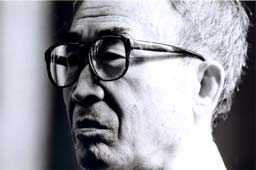
Ko Un
Ko Un (real name Ko Un-t’ae) was born in Kunsan, in what is today South Korea, in 1933. His life has been characterised by extreme biographical breaks closely tied to the history of his native country and which also surface in his work. During the Korean War he was forced into compulsory labor and attempted suicide, leading to the loss of hearing in one ear. Shaken by these experiences, in 1952 he joined an order of Buddhist monks and started to write his first poems. After leaving the monastery and enjoying a brief period of creative endeavour, he worked as director of a school from 1963 to 1967 and again began to write. The verse he wrote at this time, for instance the collection of poems »Pian Gamsung« (1967; Engl: Beyond Feelings), is fraught with a sense of the instability and futility of life. After moving to Seoul in 1967, Ko Un was overridden by feelings of self-doubt and started to drink. In 1970 he again attempted suicide. The year 1973 however, marked the start of a new creative phase and he began to get involved in politics. He took an interest in the Korean democratization movement and the attempts at reunification with North Korea. In 1974 he was appointed Secretary General of the newly founded »Association for Korean Writers for the Realization of Freedom«, which led to frequent stays in prison and much maltreatment. He was sentenced to death after the military coup in 1980, a few months later he was pardoned but put under house arrest. While under arrest, he began to write a collection of poems; the aim of which was to create portraits of all the people he had ever met in his life (»Maninbo«, started in 1986; Engl: Ten Thousand Lives). To date, 15 books from the collection have been published. His experience in the prison cell lead to a final break with his nihilistic period. His marriage in 1983 and the birth of his daughter were followed by his most prolific period, in which the collection »Junwon Sipyun« (1986; Engl: Idyllic Psalms) came into being.
Ko Un is considered one of the most important Asian poets of the twentieth century. He has more than 100 published works, which have been translated into many languages; not only books of poetry but also novels, dramas, translations, biographies, and essays. The book of poetry »Choguk-ui Byol« (1984; German title: Die »Sterne über dem Land der Väter«, 1996) and the collection »Ein Tag voller Wind« (2002; Engl: A day full of wind) are available in German. Ko Un has lived in Ansong, South Korea since 1982.
© international literature festival berlin
Maninbo
Ch´angjaksa
Seoul, 1986
The Sound of my Waves
Cornell University
Ithaca, New York, 1993
Übersetzung: Brother Anthony of Taizé, Young-Moo Kim
Beyond Self
Parallax Press
Berkeley, 1997
Übersetzung: Brother Anthony of Taizé, Young-Moo Kim
Ein Tag voller Wind
Pendragon
Bielefeld, 2002
Übersetzung: Lim Jong-Dae, Jüren Abel
Die Sterne über dem Land der Väter
Suhrkamp
Frankfurt/Main, 2005
Übersetzung: Woon-Jung Chei, Siegfried Schaarschmidt
Ko Un. Zen – Gedichte – was’n das?
Angkor Verlag
Frankfurt, 2005
Übersetzung: Hans-Jürgen Zaborowski
The Three Way Tavern
University of California Press
Berkeley, 2006
Übersetzung: Clare You, Richard Silberg
Übersetzer: Lim Jong-Dae und Jüergen Abel, Woon-Jung Chei und Siegfried Schaarschmidt, Kim Miy-He und Sylvia Braesel, Hans-Jürgen Zaborowsky
